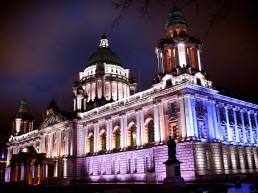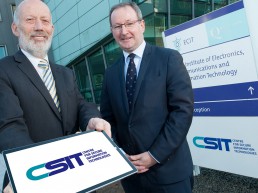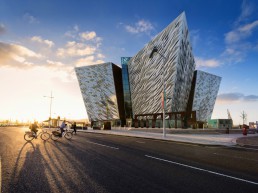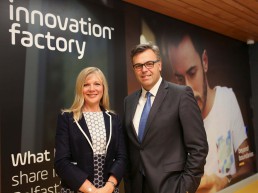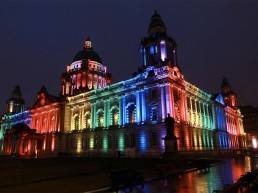1. Agreeing on our city challenges
The Belfast Agenda sets out the long term ambition for the city. Getting there needs common agreement and understanding amongst partners on the challenges we need to tackle together.
City partners must have to hand common methods and resources for identifying, understanding and designing solutions for urban challenges.
Elements of this foundation?
- Shared processes for defining a challenge and inviting others to develop innovative solutions.
- A co-design and testing environment for collaborating with citizens and stakeholders to define challenges and service requirements.
- Effective methods of communication, networking and understanding between groups to draw out priority challenges and rally stakeholders to collaborate.
- Generating, gathering and sharing city data to help prioritise challenge areas; understand problems better; shape proposals; and measure impact.
Some of the city’s resources already available:
- Ulster University’s living lab facilities such as the BioDevices Lab
- PwC and Google’s ‘Hive Lab’ promotes co-design methods for digital product design
- The Department of Finance’s Innovation team stimulate service design innovation across NI Government
- The Digital Catapult’s design methodologies accelerate service innovation in collaboration with suppliers.
- Living lab methods are being used for healthcare applications, making use of Belfast’s advanced healthcare research
- Belfast City Council is working with The Young Foundation to deliver a Social Innovation programme to equip residents with the tools to make changes in their neighbourhood
- OpenData NI, Northern Ireland’s open data portal
- Data to inform our understanding of city challenges can be sourced from the Administrative Data Research Centre which brings together Queens University Belfast, the Ulster University and the Northern Ireland Statistics and Research Agency (NISRA), NICVA’s Detail Data portal, NISRA’s NINIS small area data portal Belfast has a growing community of innovators, data scientists, technologists and active citizens. The city has a strong digital infrastructure that offers first class connectivity for organisations and individuals. To harness this resource to better address city challenges, we will work with partners to seek to build four Smart Belfast foundations.
2. Encouraging our city's innovators
Belfast has expertise that can support our smart city approach in our universities, our businesses, communities and public bodies. This can be leveraged, to embed innovation across the city.
We will do this through tools, training, networking, prizes, funding, marketing and much more. In doing so, a Smart Belfast will support investment, skills and jobs creation in growth areas of the economy.
Elements of this foundation?
- Capacity-building programme with communities and public-sector staff on creative use of data and technology for problem-solving, including data literacy and visualisation.
- Promotional activities and channels to raise Belfast’s profile as a smart city at home and abroad.
- Web-based engagement to share practice, challenge calls, support tools, and facilitate networking.
- Standard working arrangements with partners in the city, e.g. through common MOUs (memorandum of understanding).
- Participation in national and international networks to acquire knowledge, promote Belfast, and support project work.
- Connection to informal networks of developers and entrepreneurs.
- Network of centres for smart city related disciplines and for supporting innovation.
Some of the city’s resources already available:
- Catalyst Connect events, BelTech annual conference, DigitalDNA, Internet of Things Alliance (IOTA) and Internet of Things Belfast
- Major tech companies with a presence in Belfast are running digital skills and youth programmes (Barclays, Deloitte, BT, PwC)
- Networks and bodies with policy, business, digital and smart city-related membership: MATRIX industry panel, IoT Association, Digital Catapult, Ireland Smart Cities Forum
- Promoting Belfast abroad: SXSW, Barcelona Smart City EXPO World Congress, 100 Resilient Cities Network, Sister Cities, MIPIM, Invest NI digital trade missions, Catapult events
- Bank of Invention, Farset Labs, Potting Shed, Design FullOn, 2D3D,
- Young Influencers, WEF Global Shapers
- Technical centres of excellence: Centre for Statistical Science, Centre for Secure Information Technologies, and the Centre for Wireless Innovation
- Connected Health Innovation Centre, Centre of Excellence in Precision Medicine, Digital Catapult, Cognitive Analytics Research Centre, Administrative Data Research Centre
- Offices and co-working space to rent, targeted at creative and digital industry: Blick Studios, Weaver’s Court, Innovation Factory, Forthriver Business Park, The Foundry
3. Unlocking city data
Innovators and researchers in Belfast need quality data and infrastructure to develop new ideas, applications and products.
Individual projects will generate these assets but we need to ensure that they remain available across the wider innovator community through standards, sharing agreements, platforms and other mechanisms. At the same time, data must be secure and sensitively handled. Belfast must be able to reassure citizens that their data is safe through appropriate governance and oversight.
Elements of this foundation:
- City team set up to manage the development and delivery of data infrastructure.
- Data task force that ensures the production, maintenance and provision of data from different stakeholders
- Data is harmonised through open standards to meet agreed criteria: formats, licences, information policy, etc.
- Well-maintained web services, collecting users’ feedback, updating data catalogues.
- Well-maintained network of public officials, developers, companies and citizens, that leverages data infrastructure to improve quality of life and address city challenges.
Some of the city’s resources already available:
- Queen’s University Belfast Centre for Statistical Science
- Ulster University Cognitive Analytics and Research Lab (CARL)
- MATRIX industry panel recommendation for Northern Ireland digital strategy
- Strategic Investment Board initiative to set up a new centre of excellence for data science
- The Northern Ireland Executive is promoting open data through Open Data NI, supported by training and expertise deployed at local level.
- NICVA Detail Data and ODI Belfast is providing open data from public and voluntary institutions through the DetailData portal.
- NISRA is the region’s official statistics and social research agency and hosts the Northern Ireland Neighbourhood Information Service (NINIS) portal
- Land and Property Service’s Spatial NI geo-data portal
- Northern Ireland Government’s Open Data strategy which seeks to promote an ‘open by default’ approach to public sector data
- The Administrative Data Research Centre for Northern Ireland supported by Queen’s University, Ulster University and NISRA.
4. Robust delivery mechanisms
To build partnerships that will last, a Smart Belfast will need processes that will provide governance and accountability mechanisms that are not onerous but which encourage the flexibility and learning environment that innovation demands. Creating these goal-driven mechanisms is critical to collaboration among the large number of diverse stakeholders.
Elements of this foundation:
- Support from city leaders and key influencers at city and regional level
- Strategic and ethical oversight of the programme.
- An appropriate smart city entity e.g. arm’s length company, voluntary association, unofficial group etc.
- d) Provision of sustainable financing that can draw from stable sources
- Provision of funding for projects through funding management and business model expertise.
- Capacity to negotiate complex and innovative contracting and procurement arrangements with partners and with supplying SMEs and other vendors.
- Project management capacity for gathering, filtering, prioritising and managing proposals through to delivery.
- Creation, maintenance and evaluation of business case for smart city activities.
Some Of The City’s Resources Already Available:
- Belfast’s community planning partnership and its emerging delivery mechanisms
- Belfast City Council’s Smart Belfast team
- Well established cross sector city partnerships
- £2 billion of Innovate UK calls and demonstrators
- Invest NI’s Collaborative Growth programme
- SBRI programmes across NI Government Departments
- Horizon 2020 call
- Membership of Rockefeller Foundation’s 100 Resilient Cities programmes


